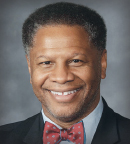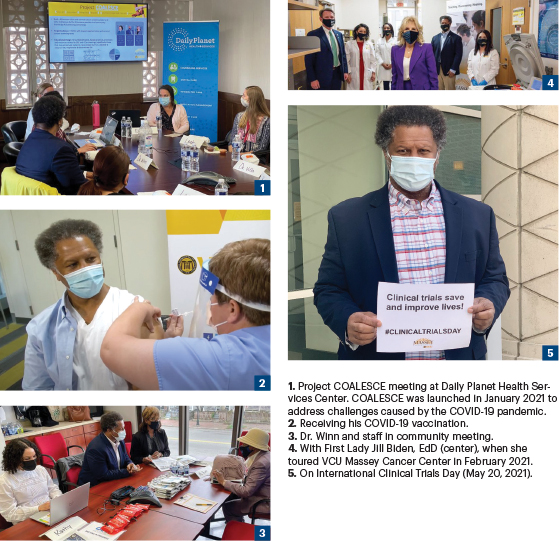In this installment of the Living a Full Life series, guest editor Jame Abraham, MD, spoke with Robert A. Winn, MD, Director of VCU Massey Cancer Center, Richmond, Virginia. In 2020, he became the first Black physician to lead a National Cancer Institute–designated cancer center. Among other things, Dr. Winn shared his vision to establish a 21st-century model of equity for cancer science and care, in which the community is informing and partnering with Massey on its research to best address the cancer burden and disparities of those the cancer center serves, with a local focus but global impact.
ROBERT A. WINN, MD

On Dr. Francis Collins: “I never dreamed about becoming a researcher, but when I was in his lecture hall, his enthusiasm for pure science was overwhelming. To this day, I employ the same type of enthusiasm with my students and mentees.”
On VCU Health’s Facts & Faith Friday initiative: “By creating bonds with leaders in the community and using well-crafted communication practices, we’ve been able to build trust, which is the cornerstone of any public health initiative.”
On the future of oncology: “I’m trying to move the bench-to-bedside framework to a people-to-pipette model, which bridges the critical disconnect between the discovery scientist and the implementation scientist.”
Robert A. Winn, MD, who was born and raised in a working-class neighborhood in Buffalo, New York, describes his road to a career in medicine as an atypical yet common American theme. “I didn’t find medicine; medicine found me. I was born to a teenaged single mom and was the first in my family to attend college. I was fortunate that there were people who saw my potential to become a physician before I did. So, having people who believed in me certainly was an important factor in my early success and choice of career paths,” said Dr. Winn.
After high school, Dr. Winn entered the University of Notre Dame to pursue his BA in psychology. “Once at Notre Dame, I knew I wanted to pursue a career that would give me the opportunity to make a difference in some way that wasn’t particularly clear at the time. Then, I met Father Walters, who ran the school’s premed program. He was a terrific person and convinced me that I should pursue a career in medicine.”
Once Dr. Winn attained his undergraduate degree, he entered the University of Michigan Medical School in Ann Arbor. “I think my path to success is an example of how people from at-risk environments who face tough challenges from the start can truly make it, when given adequate support, mentorship, and opportunities,” Dr. Winn explained. “And, I had a desire to bring what I’d learned back to the kind of challenged community I grew up in, which is a recurring theme in my career.”
Source of Inspiration
During medical school, Dr. Winn noted that one of his professors, Francis Collins, MD, PhD, the physician-geneticist who discovered the genes associated with many diseases and led the Human Genome Project, had a profound influence on his pursuit of scientific research. “He was Professor of Genetics at the University of Michigan at the time, and he had no idea of the number of students like me that he had influenced. I never dreamed about becoming a researcher, but when I was in his lecture hall, his enthusiasm for pure science was overwhelming. Then, at one point during his classes, it just happened: I fell in love with the scientific approach to identifying and solving problems. And again, that experience reenforces the idea that sometimes it takes only one person, one mentor, to inspire a life-changing decision. I took a lot from that experience in Dr. Collins’ class, and to this day, I employ the same type of enthusiasm with my students and mentees. After all, if I don’t radiate enthusiasm, it won’t spread and help elevate those entering the field,” said Dr. Winn.
GUEST EDITOR

Dr. Winn called out another formative influence on his career: a Black psychology professor, whose steely countenance was famous among medical students. “Dr. Ralph Gibson was one of the earliest Black faculty members at Michigan. He carried himself in such a commanding manner, that when I looked at him, there was no way in the world I wasn’t going to do well. In fact, there was a special ‘Dr. Gibson look’ that made us straighten up and let him know that the work he laid out was going to get done, as close to perfect as possible. There was such a sense of pride and commitment to medicine at Michigan that I realized academia was truly a vehicle in which I could become a physician-scientist and make a difference on a big scale, particularly in the at-risk communities in need. Understanding that the things I was learning were not abstract but had the power to change lives was my big ‘ah-ha moment,’” Dr. Winn said.
Honorary Oncologist
After Dr. Winn completed an internship and residency in internal medicine at Rush-Presbyterian-St. Luke’s Medical Center in Chicago, he entered a fellowship program in pulmonary and critical care medicine at the University of Colorado Health Sciences Center in Denver. Asked why he didn’t do an oncology fellowship, Dr. Winn replied: “When I went into pulmonary medicine, I became interested in lung cancer. And, back in the late 1980s and 1990s, all we really had were cisplatin-based treatments. It was a disease that had dismal outcomes.”
Dr. Winn continued: “When I got to the University of Colorado for my fellowship, Paul Bunn said that although I was a pulmonologist, I was an honorary oncologist. So, I became very excited in multiple aspects of lung cancer, such as early detection and some of the new treatments under study. Little did I know, that in the near future, all of my research would focus on bench and translational studies of signaling pathways that could lead to new drug development. Honestly, my frustration at not being able to offer better therapies for patients with lung cancer was a key driver on my road to oncology.”
Goals and Awareness
When Dr. Winn assumed the leadership of VCU Massey Cancer Center in 2019, he had two goals that he was “unapologetic” about pursuing: “First, I certainly wanted to help develop new treatments that would lead to a cure for cancer, but second, I also wanted to make sure that we put special emphasis on communities at risk and do everything we could to eradicate disparities,” he said.
Dr. Winn continued: “When I talk about disparities, I remind people that the issues of harsh inequality we’re facing today were most eloquently elucidated by W.E.B. Du Bois in his famous 1899 Philadelphia Papers.* It’s important to note that in 2019 and 2020, the pandemic and the George Floyd killing put a national spotlight on unequal treatment in health care and law enforcement, which has hopefully ignited a movement for lasting social change. I think with George Floyd we paused and had a collective awareness and realized that inequality issues were also exacerbating the COVID-19 pandemic, which affects everyone, not just those in marginalized settings. So, in effect, it became one team, one fight, a much-needed call to action.”

Dr. Winn explained that this moment in history wasn’t lost on the leadership of VCU Massey Cancer Center. “During the early part of 2020, we were conducting numerous cancer clinical trials while dealing with the mass confusion in the community about COVID-19. It wasn’t evident what our Black communities were supposed to do. People were frightened and confused; there was even a myth spreading that Black individuals could not get COVID-19. We at Massey Cancer Center and VCU Health wanted to provide good, reliable information, as we had it, and bust the myths,” he explained. “So, we literally took it to the streets and created Facts & Faith Friday, in which we made a commitment to meet with faith-based leaders throughout the state of Virginia. By creating bonds with leaders in the community and using well-crafted communication practices, we’ve been able to build trust, which is the cornerstone of any public health initiative,” he stated.
Dr. Winn continued: “Building trust takes work, and we took a stepwise approach. First, we had to let people know that our interests at VCU Massey were directly relevant to the needs of the community. Second, we had to demonstrate accessibility, which means making your institution accessible, even when the Zoom meeting is off. And the third part is flexibility; your platform has to be flexible enough to address the changing needs of the community.”
Vision for the Future of Oncology
Asked to share his vision for the future of oncology, Dr. Winn responded: “I’m trying to move the bench-to-bedside framework to a people-to-pipette model, which bridges the critical disconnect between the discovery scientist and the implementation scientist. In reimagining what a 21st century cancer center does, we need to be constantly aware that by absorbing ourselves in big data, which rapidly get bigger, we run the risk of making the community invisible.”
According to Dr. Winn, the way to avoid that pitfall is to use small-area analyses. “For example, we now have a way to look not only at zip codes but political neighborhoods, because everyone knows where they vote,” he explained. “Consequently, we began breaking our health units into voting districts, so we can glean usable health data for us to refine our science, so it can translate into better health outcomes for the community.”
Bringing More Minorities Into Oncology
Dr. Abraham asked Dr. Winn how can more minority students be brought into the field of oncology? Dr. Winn answered: “Many of us in the field desire to create a more diverse work field, but we do not have a solid recruitment plan in place. When I was Dean of Admissions at Colorado, my job was to get the 162 best recruits available. By the end of my tenure, the percentage of minority recruits went from 4% to 42%. People asked me how I did it. It’s quite simple: People from underrepresented communities don’t know that you want them unless you ask—and I asked. Plus, many of my recruits outperformed the normal test standards. Once again, underrepresented minority communities are filled with potential; we simply need to reach out and let them know we want them.”
How does a super-busy cancer center director unwind? “Thank goodness for weights and home gym equipment and books. I unwind with exercise and reading, plus my kids, who remain the best way of all to put everything in perspective.”
DISCLOSURE: Dr. Winn reported no conflicts of interest.
*In 1899, sociologist and author W.E.B. Du Bois published an in-depth analysis and portrait of African Americans in an urban environment, focusing on Philadelphia’s Black Seventh Ward from 1600 to 1897. It was originally published by the University of Pennsylvania Press.

